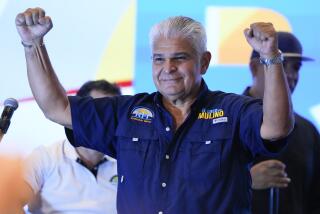But Watch It If Pinochet Grumbles
- Share via
Democracy in Chile? After 16 years of often harsh and sometimes murderous military dictatorship, Chile was reunited with its honorable (if largely forgotten) history of democratic government last week, overwhelmingly electing a civilian to succeed Gen. Augusto Pinochet as president.
Patricio Aylwin, a Christian Democrat representing a broad coalition of political parties, won a landslide victory over two other candidates, including Pinochet’s former finance minister. Just as important as victory was the peaceable voting, held without the tension and violence that marked a plebiscite earlier this year in which Chilean voters rejected Pinochet’s bid to stay in office for eight more years.
Unfortunately this is not to say that Pinochet will fade quietly from the scene. The general will remain the commander of the armed forces. And before it gave up power, the military junta he heads issued several last-minute laws to limit the new government’s powers in economic policy and military affairs. And so Aylwin’s first big test as president will be trying to get those laws repealed by the new Chilean Congress, also elected last week. This may just be possible because there is a consensus among all of Chile’s political parties that it is time for full democracy to be restored. But Aylwin must tread cautiously, for Pinochet is notoriously self-righteous and remains convinced that he alone saved Chile from communism in 1973.
That was when Pinochet and other military officers ousted an elected Marxist President, Salvador Allende, and imposed a repressive regime that gave Chileans a successful free-market economy, but at the price of their political freedom. Before the coup, the military had stayed out of civilian politics for almost 50 years, making Chile a notable and encouraging exception in Latin America.
If Aylwin is the cautious politician he appears to be--and if Chileans are as determined to return to democracy as they appear to be--the military may be persuaded to stay in the barracks, no matter how much Pinochet grumbles.
More to Read
Sign up for Essential California
The most important California stories and recommendations in your inbox every morning.
You may occasionally receive promotional content from the Los Angeles Times.













